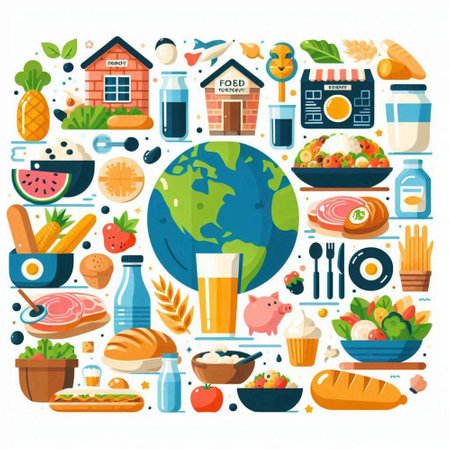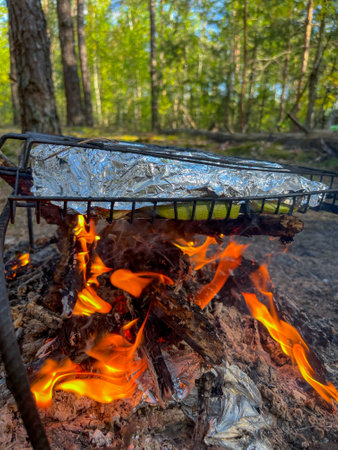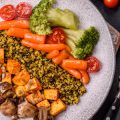Understanding British Vegan and Vegetarian Essentials
Embarking on a camping trip across the British countryside as a vegan or vegetarian means you need to master more than just pitching a tent—you must understand how to nourish yourself with plant-based foods that fit both your values and the rugged, often unpredictable UK climate. At its core, vegan and vegetarian nutrition focuses on whole grains, legumes, nuts, seeds, fruits, and vegetables—offering the energy, protein, fats, vitamins, and minerals essential for outdoor adventure.
Plant-Based Nutrition: The Basics
A successful camp menu starts with the fundamentals: complex carbohydrates for long-lasting energy (think oats and wholemeal bread), protein from lentils, chickpeas, or beans, and healthy fats via nuts or local rapeseed oil. Dont forget micronutrients—B12 (via fortified products), iron (dark leafy greens and pulses), calcium (fortified plant milks), and vitamin D (supplements or sunlight exposure when possible).
British Staples for Outdoor Cooking
The backbone of British vegan and vegetarian fare includes classics like baked beans, oatcakes, new potatoes, root veg such as carrots and swede, seasonal berries, mushrooms, apples, and onions. Many are robust enough to survive a few days in a rucksack. Tinned tomatoes and tinned pulses are shelf-stable heroes—ideal for hearty stews cooked over a camp stove or fire.
Adapting to the Wild
Outdoor cooking demands simplicity without compromising nutrition. Prioritise foods that don’t require refrigeration and can be prepared with minimal kit. Pre-mix spice blends at home for curry or stew bases; pack porridge sachets for quick breakfasts; bring along reusable containers of dried fruit or nuts for snacking. Flexibility is key—embrace improvisation with local market finds or wild edibles like blackberries in late summer.
Survival Tip
Always plan for one extra day’s worth of food in case weather or mishaps delay your return. Use traditional British staples in creative ways—a tin of mushy peas can bulk out soups or serve as a sauce base. By understanding these essentials, you’ll have the confidence to fuel any adventure while respecting both nature and your plant-based principles.
2. Prepping for the Great Outdoors: Packing and Storage Tips
When planning a vegan or vegetarian camping menu in the unpredictable British climate, preparation is everything. The right packing and storage strategies not only keep your food fresh but also ensure you’re ready to face anything from a downpour in the Lake District to a blustery night on Dartmoor. Here’s how to get it right, hard-nosed survivalist style.
Choosing Your Ingredients Wisely
Start by selecting foods with natural resilience to temperature swings and moisture. Prioritise long-lasting staples such as tinned beans, lentils, and vacuum-packed grains. Fresh produce like root veg (carrots, potatoes) and hardy greens (kale, cabbage) endure British weather far better than delicate salad leaves or soft fruits. For protein, opt for smoked tofu or shelf-stable meat alternatives. Don’t forget high-energy snacks—oatcakes, nut butters, and dried fruit are classic choices that won’t wilt under pressure.
Best Storage Containers for Camping
| Container Type | Best For | British Weather Suitability |
|---|---|---|
| Heavy-Duty Cool Bags | Dairy-free milks, spreads, salads | Keeps perishables cool during mild spells; add ice packs for hotter days |
| Airtight Plastic Tubs | Pre-cooked grains, roasted veg | Stops rainwater ingress and prevents wildlife interference |
| Ziplock Bags | Nuts, trail mix, spices | Lightweight and easy to stash in rucksacks; seal tightly against damp air |
| Tins & Jars | Pulses, sauces, pickles | Virtually indestructible; perfect for rough handling and wet conditions |
Packing Techniques for Survival & Freshness
Layer your food supplies with methodical precision. Place heavier items like tins at the bottom of your pack or car boot. Separate each meal’s ingredients into clearly labelled bags or tubs—this not only keeps things organised but reduces faff when the weather turns grim. Wrap bread or tortillas in a tea towel before sealing in a bag to avoid sogginess from condensation. Always double-bag anything prone to leaking.
Key Tips for Outwitting British Weather
- Store perishables out of direct sunlight and away from tent walls where condensation gathers.
- If you’re wild camping, bury a sealed container in cool earth overnight—it’s an old trick that works wonders.
- Use waterproof dry sacks inside rucksacks for extra protection on wet hikes.
- Plan at least one no-cook meal per day as backup if driving rain kills your campfire ambitions.
- Bring spare bin liners—they’re indispensable for keeping food dry, doubling as makeshift ponchos if the heavens open.
The British countryside is stunning but unforgiving if you’re unprepared. Master these packing and storage tactics and your vegan or veggie provisions will last the journey—rain or shine.

3. Menu Planning for British Campsites
Building a cracking vegan or vegetarian menu for your British camping adventure isn’t just about avoiding animal products—it’s about crafting hearty, balanced meals that fuel you through all weathers and wild landscapes. The UK’s supermarkets are well-stocked with plant-based staples, and with a bit of know-how, you can make the most of both local produce and nationwide brands. Here’s how to strategise like a pro camper:
Prioritise Local and Seasonal Veg
Basing your meals around locally-sourced veg not only supports British growers but also guarantees freshness and flavour. Think root veg like carrots, potatoes, and parsnips in colder months, or courgettes, peas, and spinach during summer. Check out farm shops near your campsite or see what’s on offer at the nearest supermarket—many now label British-grown produce clearly.
Build Satisfying Meals with Smart Pairings
Aim for a mix of complex carbohydrates (wholegrain bread, oats, brown rice), plant proteins (tinned beans, lentils, tofu), and healthy fats (nuts, seeds, olive oil). Classic combos like jacket potatoes with baked beans and salad, vegetable stew with crusty bread, or chickpea curry with rice are filling and easy to cook over a camp stove. Don’t forget classic British camping snacks like oatcakes or rice cakes topped with hummus or nut butter for quick energy boosts.
Supermarket Staples That Work Anywhere
You’ll find plenty of vegan and veggie-friendly products in major UK supermarkets—think Linda McCartney sausages for an easy breakfast fry-up, vegan cheese for sandwiches, or plant-based milks for your morning brew. Pre-cooked grains, tinned soups, falafel packs, and ready-to-eat salads are perfect for quick lunches when you’re on the move. Always check labels for hidden animal-derived ingredients; “suitable for vegetarians/vegans” is commonly marked on British packaging.
Snack Smart on the Trail
Keep energy levels up with portable snacks: dried fruit mixes, flapjacks (many supermarkets offer vegan options), nut bars, or good old-fashioned bananas and apples. For a traditional touch, pack some British-made crumpets or scones—just check they’re made without milk or eggs if you’re vegan.
Plan Ahead but Stay Flexible
British weather is famously unpredictable—so design menus that can adapt if rain stops play. Choose recipes that work whether you’re cooking over an open fire or using a small gas stove. Bring a stash of herbs and spices in small containers to brighten up simple dishes if fresh supplies run low.
With these strategies in your kitbag, you’ll be ready to whip up nutritious meals wherever your tent is pitched—from Cornish clifftops to Highland lochs—all while embracing the best of Britain’s vegan and vegetarian bounty.
4. Campfire and Camping Stove Cooking Techniques
Step-by-Step Rugged Methods for Plant-Based Camp Cooking
Mastering the art of campsite cooking is essential for any vegan or vegetarian venturing into the British outdoors. Whether you’re on a windswept moor or tucked away in a woodland glade, these hardy methods will ensure your meals are both hearty and hassle-free.
Essential Kit Checklist
| Equipment | Purpose |
|---|---|
| Sturdy campfire grill | For direct fire grilling and roasting veg or plant-based burgers |
| Camping stove (gas or multi-fuel) | Reliable mainstay for boiling, simmering, or frying mains and sides |
| Heavy-duty pan/skillet | Perfect for one-pot wonders and sautéing onions, mushrooms, etc. |
| Foil packets (tin foil) | For steaming veg and creating easy prep parcels with minimal washing up |
| Billy can/kettle | Boiling water for teas, oats, or couscous; doubles as soup pot |
| Tongs & spatula | For safe food handling over flames or hot stoves |
Fire & Stove Cooking: Step-by-Step Guide
1. Prepping Your Ingredients Like a Pro
- Pre-chop at Home: Dice tough veg like carrots and potatoes before heading out—store in airtight containers.
- Marinate: Soak tofu or tempeh in oil and British herbs (thyme, rosemary) overnight for deeper flavour.
- Packed Sides: Bring tinned beans, vacuum-packed grains, and oatcakes—true staples of rugged British camping.
2. Setting Up Your Cooking Zone Safely
- Select Flat Ground: Prevent accidents by picking a stable spot for your stove or fire grill.
- Shelter from Wind: Use natural windbreaks or set up behind a dry-stone wall (mind local guidelines).
3. Cooking Vegan & Veggie Mains Over Fire/Flame
| Main Course | Campsite Method | Tactical Tip |
|---|---|---|
| Lentil stew with root veg | Billy can or heavy-duty pan over stove/fire; simmer gently 20–30 mins. | Add Marmite for classic umami depth! |
| Mushroom & leek pie filling (serve with bread) | Sauté leeks and mushrooms in skillet; add plant cream; heat through. | Bake ready-made pastry on grill wrapped in foil. |
| Stuffed peppers/courgettes | Wrap stuffed veg in foil; nestle into embers; rotate every 10 mins. | Add pre-cooked rice/quinoa stuffing for speed. |
4. Whipping Up Sides & Treats with Minimal Fuss
- Baked Beans Upgrade: Heat tinned beans with smoked paprika over low flame—serve on toasted sourdough.
- Crispy Potatoes: Parboil at home, then fry in skillet with rapeseed oil at camp until golden brown.
5. Sweet Campfire Endings (Vegan & Vegetarian)
- Campfire Bananas: Split banana lengthwise, stuff with dark chocolate and nuts; wrap in foil; roast 10 mins in embers.
- Porridge Oats: Bring water to boil in billy can; stir in oats, dried fruit, and a splash of oat milk. Ready in minutes.
Troubleshooting: Keeping It Rugged Yet Safe
- If it rains, use a tarp shelter to keep your cooking area dry.
- Avoid open fires during dry spells—stick to stoves as per campsite rules.
Nail these techniques and you’ll be feasting like a hardened British wild camper—no meat required. Next up: meal planning hacks to keep spirits high whatever the weather throws your way!
5. Sample Menus for Short and Extended Trips
Weekend Camping Menu: Quick, Satisfying, and British
Day 1
Breakfast:
Porridge oats with dried berries and a drizzle of golden syrup – a classic warm start that fuels your morning hike.
Lunch:
Wholemeal bread sandwiches with hummus, grated carrot, cucumber, and watercress – easy to assemble on the go, no refrigeration needed.
Dinner:
Lentil stew with root vegetables (carrots, parsnip, potatoes) served alongside crusty vegan rolls. A hearty main that sticks to your ribs after a long day outdoors.
Day 2
Breakfast:
Baked beans on toast – quintessentially British and packed with protein for energy.
Lunch:
Savoury oatcakes topped with vegan cheese and sliced tomatoes, plus an apple or pear for crunch.
Dinner:
Mushroom and spinach risotto cooked over the fire; finish off with a square or two of dark chocolate for dessert.
Extended (Week-Long) Camping Excursion Menu
Breakfasts
- Vegan full English: grilled tomatoes, mushrooms, hash browns, baked beans, and toast
- Bircher muesli soaked overnight in oat milk with seasonal fruits
Lunches
- Pita pockets stuffed with falafel, shredded lettuce, pickled onions, and tahini dressing
- Couscous salad with chickpeas, roasted peppers, olives, and parsley – easy to prep ahead and pack in tubs
Dinners
- Chilli sin carne: kidney beans, sweetcorn, chopped tomatoes simmered with smoked paprika; serve with rice or baked potatoes
- Vegan shepherd’s pie: lentils and veg topped with mash (can be cooked in a Dutch oven on the campfire)
Snacks & Quick Bites for the Trail
- Flapjacks made with oats and maple syrup – a British staple for energy boosts
- Savoury roasted chickpeas or nuts spiced with sea salt and vinegar flavouring
Tactical Tips for British Tastes
Select meals that are warming and filling – think robust stews and bakes. Opt for local ingredients where possible (British apples, root veg). Always pack extra tea bags; there’s nothing like a cuppa by the fire. Rotate menus if camping longer than a week to keep morale high and taste buds interested. With this approach, you’ll survive – no matter how wild or rainy the British wilderness gets.
6. Weather-Proofing Your Menu
Adapting to the Unpredictable British Climate
If you’ve ever camped in Britain, you know that the weather can turn from glorious sunshine to sideways rain within the hour. When planning vegan and vegetarian menus for your camping trip, it’s vital to build in flexibility and technical resilience so mealtime doesn’t get derailed by a sudden downpour or gusty wind.
Choose Versatile Ingredients
Opt for ingredients that hold up well in damp or cool conditions. Root vegetables like carrots, potatoes, and parsnips are not only filling but also resilient to temperature swings and humidity. Tinned beans, lentils, and grains such as couscous or bulgur wheat are lightweight, non-perishable, and quick to cook even on a small camp stove.
Meal Prep and Storage Tactics
Pre-chop vegetables at home and store them in airtight containers or eco-friendly bags to cut down exposure to moisture at camp. If you’re bringing plant-based cheese or tofu, keep them chilled with ice packs in a sturdy cool box. Consider vacuum-sealing portions for added protection against rain seepage.
Cooking Methods for All Weather
Always have a reliable backup: if you’re counting on an open fire but the heavens open, a portable gas stove is your best mate. Invest in a windscreen for your stove to maintain heat efficiency and keep your flame steady. For rainy days, one-pot dishes like vegan stews or veggie chilli are ideal—they minimise washing up and can be cooked quickly under shelter.
Pro Tip: Hot Drinks Are Essential
Never underestimate the morale boost of a hot cuppa when the weather turns foul. Pack plenty of herbal tea bags, instant coffee, or oat milk hot chocolate sachets—these require minimal prep and can be brewed quickly on any heat source.
Rain-Ready Snacks and Emergency Rations
Stock up on energy-dense snacks such as flapjacks, oatcakes, dried fruit, and nut mixes. These keep well even if things get damp and will tide you over if meal prep gets interrupted by the elements.
Pack Smart, Stay Flexible
Stow all food supplies in waterproof bags or dry sacks. Always have a roll of kitchen foil—it doubles as a rain shield for pans or makeshift lids to keep heat in while cooking outdoors. The key is redundancy: bring spares of lighters or matches (stored in waterproof containers) so your plans aren’t scuppered by wet gear.
The Hard Truth
No menu survives first contact with British weather unchanged—but with these technical strategies, your vegan or vegetarian meals will stay hearty, satisfying, and safe from soggy disaster, no matter what the skies throw at you.
7. Sourcing Ingredients and Eco-Friendly Clean-Up
When it comes to planning vegan and vegetarian menus for British camping trips, sourcing quality plant-based ingredients and ensuring responsible clean-up are essential skills for any outdoor adventurer. Here’s how to keep your meals hearty, ethical, and sustainable while exploring the UK’s wild places.
Finding Plant-Based Ingredients Across the UK
Britain is brimming with options for plant-based eaters—if you know where to look. For urban departures, major supermarkets like Tesco, Sainsbury’s, and Waitrose now stock robust vegan and vegetarian ranges, from meat alternatives to plant milks and ready-to-eat snacks. For a more local touch or when venturing into rural areas, seek out independent greengrocers, farm shops, and village markets. These often provide seasonal veg, artisan breads, and preserves that elevate campfire cuisine.
Pro tip: Plan your menu around what’s in season; British produce such as carrots, potatoes, cabbage, apples, and berries are affordable and widely available from spring through autumn. If hiking or wild camping in remote regions like the Lake District or Scottish Highlands, bring dried pulses, tinned beans, nuts, seeds, and long-life tofu for nutrition without refrigeration worries.
Sustainable Waste Management
Leave no trace is the mantra of hard-nosed campers. All packaging—especially plastics—should be packed out and recycled at proper facilities when you return to civilisation. Compostable food waste can sometimes be buried away from water sources (at least 15cm deep), but check local guidelines first. Many UK National Parks have strict rules against burying any rubbish.
Tip: Bring reusable containers or beeswax wraps for storing leftovers and cut down on single-use plastics by decanting bulk goods into smaller tubs before your trip.
Eco-Friendly Washing Up
Washing up in the wild requires care: always use biodegradable washing-up liquid (such as Ecover or Bio-D) in minimal amounts. Wash up at least 50 metres away from streams or lakes to prevent contamination.
Field method: Scrape plates thoroughly before washing; carry a small scrubbing brush and microfibre cloth. Heat water over your stove or fire if necessary. Strain greywater through a sieve to catch food scraps (which you pack out), then scatter used water over a wide area away from waterways.
The Bottom Line
Sourcing top-notch vegan and vegetarian fare is easy across Britain if you plan ahead—and sticking to eco-friendly clean-up practices ensures our wild spaces remain pristine for future explorers. With a bit of prep and a survivalist’s respect for the land, your camp kitchen can be both deliciously green and responsibly run.

